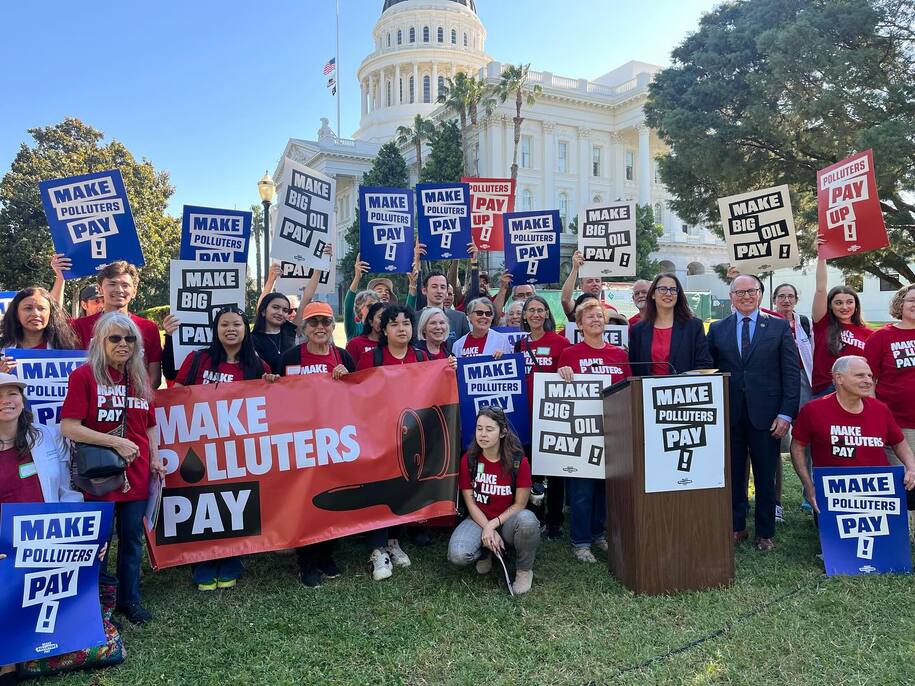Chevron represented 49% of industry’s $8.3M expenditure, as company landing permits in setbacks zone on day setbacks referendum pulled rises in ranks.
Sacramento, California — Newly published disclosures for quarter two show that the oil industry spent around $8.3 million on lobbying and influence activities. Aera Energy and California Resources Corporation (now one company, CRC, after the recent completion of their merger), Chevron, and the Western States Petroleum Association (WSPA) spent a combined $6.8 million alone.
The top ten spenders can be seen below.
| Company | Spending |
| Chevron | $4,070,286 |
| Western States Petroleum Association | $1,782,919 |
| Aera Energy | $784,852 |
| Phillips 66 | $221,107 |
| Marathon Petroleum | $202,215 |
| California Resources Corporation | $190,398 |
| Synergy Oil & Gas | $140,250 |
| California Independent Petroleum Association | $118,065 |
| ExxonMobil | $110,605 |
| BP | $84,025 |
The now $15.3 million spent in the first half of the year paces Big Oil to surpass its $26.2 million record set in 2017. In 2023, the second-highest industry spending year on record, Big Oil spent $25.4 million. For a two-year legislative session, the oil industry is likely to spend more than it ever has on a biennial basis — $44 million in 2017-2018 — by the end of the year, already sitting at $42 million spent halfway into 2024.
Chevron spent around $2.8 million, about 68% of its total spend, financing the WSPA-created front group Californians for Energy Independence (CEI). Aera also spent over $694,000 financing CEI for the quarter. This comes as CEI has begun publishing social media ads targeting the polluter accountability legislative agenda. During the quarter, Chevron funded 49% of all Big Oil influence activities.
The much smaller, Synergy Oil & Gas ranked among the oil majors as a top spender, clocking in at number seven. This comes as Synergy racked up 17 oil drilling permits within the 3,200-foot setbacks zone on the same day the oil industry pulled its referendum challenging the state’s 3,200-foot setbacks law from the ballot, negating a November vote. Synergy’s disclosure documents show that it lobbied the Governor’s Office, the Legislature, and the California Natural Resources Agency on issues pertaining to the Seal Beach location housing the oil well sites.
“Big Oil has relied on big lobby spending to dominate California politics for too long. Californians have become wise to their antics and demand the industry pays for the harm it’s brought to our communities and the environment, said Nicole Ghio, Senior Fossil Fuels Program Manager at Friends of the Earth. “California decision makers must not be blinded by slick oil and gas lobbying from corporations like Synergy that are pushing drilling permits in the buffer zone between wells and communities. Our officials must put our health and climate ahead of Big Oil profits.”
Chevron, Aera, and CRC — collectively the top idle wells holders statewide — all lobbied to stave off the legislative momentum amassing around AB 1866, a bill which would compel oil drillers to plug all idle wells statewide within a decade. Their lobbying group, WSPA, also lobbied against the bill — as did California Independent Petroleum Association (CIPA), another oil industry lobbying group. The same groups lobbied against AB 3233, another still-moving bill that would facilitate local government regulation of oil and gas.
Other than CIPA, all of the top ten spenders also lobbied against SB 1497, a now-dead bill that would have required fossil fuel polluters to pay their fair share in damages for their role in causing climate change-fueled disasters. Further, Chevron, WSPA, Phillips 66, and CRC all successfully lobbied to kill SB 252, legislation that called on state public pension funds to divest from fossil fuels.
“Our frontline communities have long been harmed by Big Oil and their practices. As the industry is gasping its last breath, we are now being subjected to a relentless battle by the same oil companies to dodge accountability,” said Kobi Naseck, Coalition Director of VISIÓN California. Our resolve remains unbroken. We will continue to demand that oil companies are held accountable, not just for the pollution of our environment, but for the health and safety of our communities, both now and for future generations.”
Chevron and ExxonMobil also lobbied against SB 253 and SB 261, laws passed in 2023 that in the coming years would compel climate impact disclosures for the state’s largest corporations. The implementation of those laws, however, could be put on pause by the state if proposed trailer bill amendments introduced by Governor Gavin Newsom pass. Chevron’s legal counsel, Gibson Dunn, also brought a lawsuit against both laws on behalf of the U.S. Chamber of Commerce and California Chamber of Commerce earlier this year. Chevron’s disclosure form notes that it contributed $50,000 to the CalChamber for the year.
Additional details on mid-year oil industry lobbying spending, campaign contributions, and recipients of the campaign dollars are all available upon request. Please email Blake@sunstonestrategies.org for more information.
###
METHODOLOGY
The numbers for this press release came from taking the original oil and gas industry list compiled by CalAccess and then removing any companies placed on the list which are part of the biomass or carbon removal industries. The California Carbon Solutions Coalition remains on the list because it is heavily funded by the oil and gas industry. The California Fuels and Convenience Alliance is also on the list because they serve as a seller of petroleum-derived gasoline, are lobbying against implementation of a price gouging penalty for oil refiners, and share a lobbying firm with Chevron. Oxy Low Carbon Solutions, too, has been placed on the list because it is a subsidiary of oil giant Occidental Petroleum and is lobbying the California Air Resources Board to allow Direct Air Capture financial credits generated under the Low Carbon Fuel Standard to be used for offsetting emissions for their oil drilling in West Texas’ Permian Basin.
LCA LAND ACKNOWLEDGEMENT
We acknowledge that Sacramento is the traditional home of the Maidu, Miwok and Nisenan people. Part of our commitment to decolonizing ourselves, our language, and our organizations is a commitment to learning and better understanding the history of Indigenous Peoples of so-called California, including the history of contact, colonization and the extraction of resources from Indigenous lands which has been part of the continuation of modern colonization.



